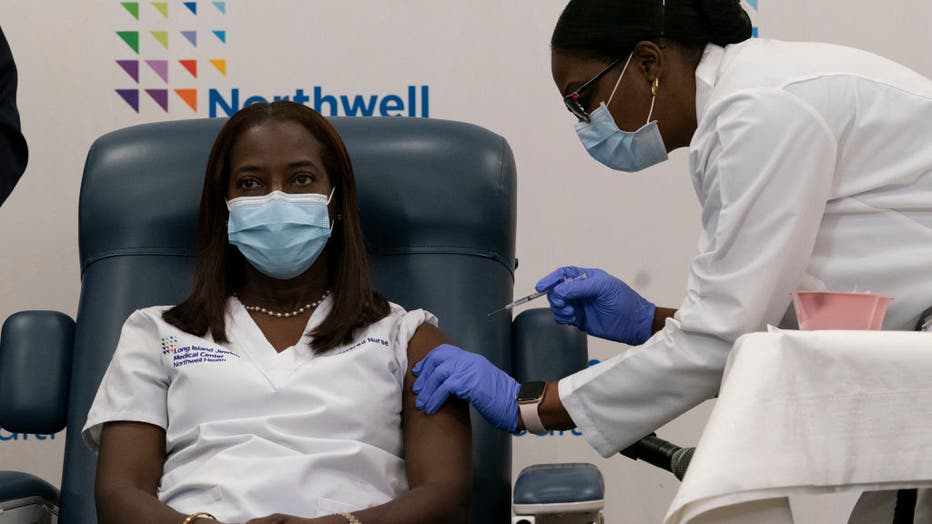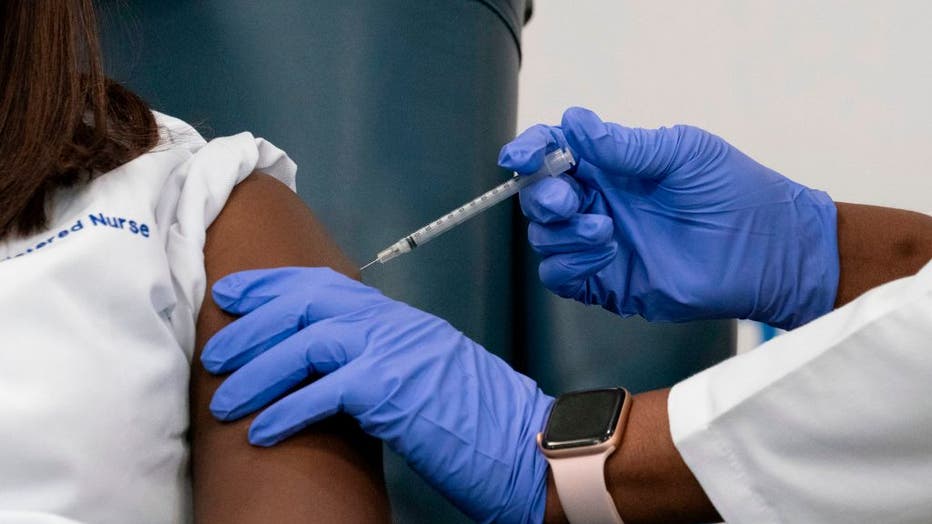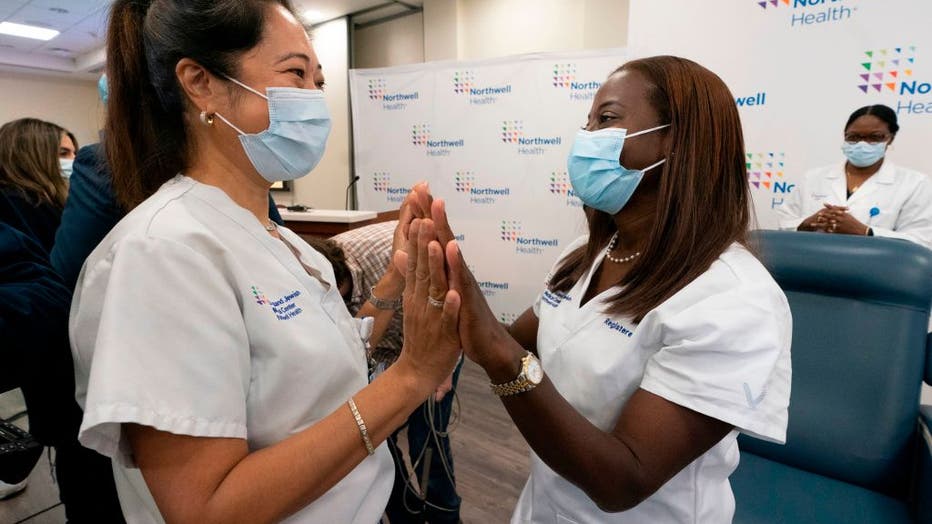NYC critical care nurse first to receive coronavirus vaccine in U.S.
NEW YORK - A critical care nurse from Queens was the first person in the United States to receive the vaccine for the coronavirus, Mayor Bill de Blasio announced Monday.
The largest vaccination campaign in U.S. history was underway as health workers in select hospitals rolled up their sleeves for shots to protect them from COVID-19 and start beating back the pandemic — a day of optimism even as the nation's death toll neared 300,000.
"I feel hopeful today. Relieved," Sandra Lindsay after getting a shot in the arm at Long Island Jewish Medical Center located in Glen Oaks.
"Absolutely beautiful moment. A beautiful moment. There was such — to me it was not just a moment where hope was realized. I felt that deeply. Just when I saw it — this is a needle I'm very happy about," de Blasio said.
Shipments of precious frozen vials of vaccine made by Pfizer Inc. and its German partner BioNTech began arriving at hospitals around the country Monday.
NYC nurse receives first COVID vaccine
A critical care nurse from Queens was the first person to receive the coronavirus vaccine in the United States.
"When I saw the needle go into the nurse's arm, I felt this welling up of hope. Amazing sense of we are actually turning the corner, it is actually here," de Blasio said. "It was extraordinary. It was amazing she didn't flinch. Incredible historic moment."
A shipment was on its way to five hospitals in New York City on Monday with 37 hospitals receiving a shipment Tuesday and the remaining two on Wednesday," NYC Health Commissioner Dr. Dave Chockshi said.
Nurse first to get COVID vaccine in NYC
A critical care nurse from Queens was the first person in New York City to be vaccinated for the coronavirus.
"We are going to use every tool at our disposal. Our vaccine command center will lead the way. Every city agency and every city employee will be a part of this to make sure all New Yorkers are served. Nowhere is there the ability, the strength, and the know how more than New York City to get something like this done," said de Blasio.
"As we get more confirmation on precise deliveries that's the information we can share over time," said Chockshi.
“This is the light at the end of the tunnel. But it’s a long tunnel,” New York Gov. Andrew Cuomo said as he watched Lindsay's vaccination via video.

Sandra Lindsay(L), a nurse at Long Island Jewish Medical Center, is inoculated with the Covid-19 vaccine by Dr. Michelle Chester, at Long Island Jewish Medical Center, on December 14, 2020 in the Queens borough of New York. (Photo by MARK LENNIHAN/PO
Several other countries also have OK'd the vaccine, including the U.K., which started vaccinating last week.
For health care workers who, along with nursing home residents, will be first in line for vaccination, hope is tempered by grief and the sheer exhaustion of months spent battling a coronavirus that still is surging in the U.S. and around the world.
Get breaking news alerts in the FOX5NY News app. Download for FREE!
"This is mile 24 of a marathon. People are fatigued. But we also recognize that this end is in sight," said Dr. Chris Dale of Swedish Health Services in Seattle.
Packed in dry ice to stay at ultra-frozen temperatures, the first of nearly 3 million doses being shipped in staggered batches this week made their way by truck and by plane around the country Sunday from Pfizer’s Kalamazoo, Michigan, factory. Once they arrive at distribution centers, each state directs where the doses go next.

Sandra Lindsay(L), a nurse at Long Island Jewish Medical Center, is inoculated with the Covid-19 vaccine by Dr. Michelle Chester, at Long Island Jewish Medical Center, on December 14, 2020 in the Queens borough of New York. (Photo by MARK LENNIHAN/PO
Some hospitals across the country spent the weekend tracking their packages, refreshing FedEx and UPS websites for clues.
More of the Pfizer-BioNTech vaccine will arrive each week. And later this week, the FDA will decide whether to green light the world’s second rigorously studied COVID-19 vaccine, made by Moderna Inc.
Now the hurdle is to rapidly get vaccine into the arms of millions, not just doctors and nurses but other at-risk health workers such as janitors and food handlers — and then deliver a second dose three weeks later.
“We’re also in the middle of a surge, and it’s the holidays, and our health care workers have been working at an extraordinary pace,” said Sue Mashni, chief pharmacy officer at Mount Sinai Health System in New York City.
Plus, the shots can cause temporary fever, fatigue, and aches as they rev up people's immune systems, forcing hospitals to stagger employee vaccinations.
RELATED: First US COVID-19 vaccinations given as shipments arrive nationwide
A wary public will be watching closely to see whether health workers embrace vaccination. Just half of Americans say they want to get vaccinated, while about a quarter don’t and the rest are unsure, according to a recent poll by The Associated Press-NORC Center for Public Health Research.
The FDA, considered the world’s most strict medical regulator, said the Pfizer-BioNTech vaccine appears safe and strongly protective — and laid out the data behind it in a daylong public meeting last week for scientists and consumers alike to see.

Nurse Annabelle Jimenez(L) congratulates nurse Sandra Lindsay after she is inoculated with the Covid-19 vaccine, at Long Island Jewish Medical Center, on December 14, 2020 in the Queens borough of New York. (Photo by MARK LENNIHAN/POOL/AFP via Getty
“Please people, when you look back in a year and you say to yourself, ‘Did I do the right thing?’ I hope you’ll be able to say, ‘Yes, because I looked at the evidence,’” Dr. Francis Collins, director of the National Institutes of Health, said Sunday on NBC’s Meet the Press. “People are dying right now. How could you possibly say, ‘Let’s wait and see.’”
Still, emergency use means the vaccine was cleared for widespread use before a final study in nearly 44,000 people is complete -- and that research is continuing to try to answer additional questions. While effective against COVID-19 illness, it’s not yet clear if vaccination will stop the symptomless spread that accounts for half of all cases.
The shots still must be studied in children, and during pregnancy. But the American College of Obstetricians and Gynecologists said late Sunday that vaccination should not be withheld from pregnant women who otherwise would qualify.
While the vaccine was determined to be safe, regulators in the U.K. are investigating several severe allergic reactions. The FDA’s instructions tell providers not to give it to those with a known history of severe allergic reactions to any of its ingredients.
With the Associated Press

